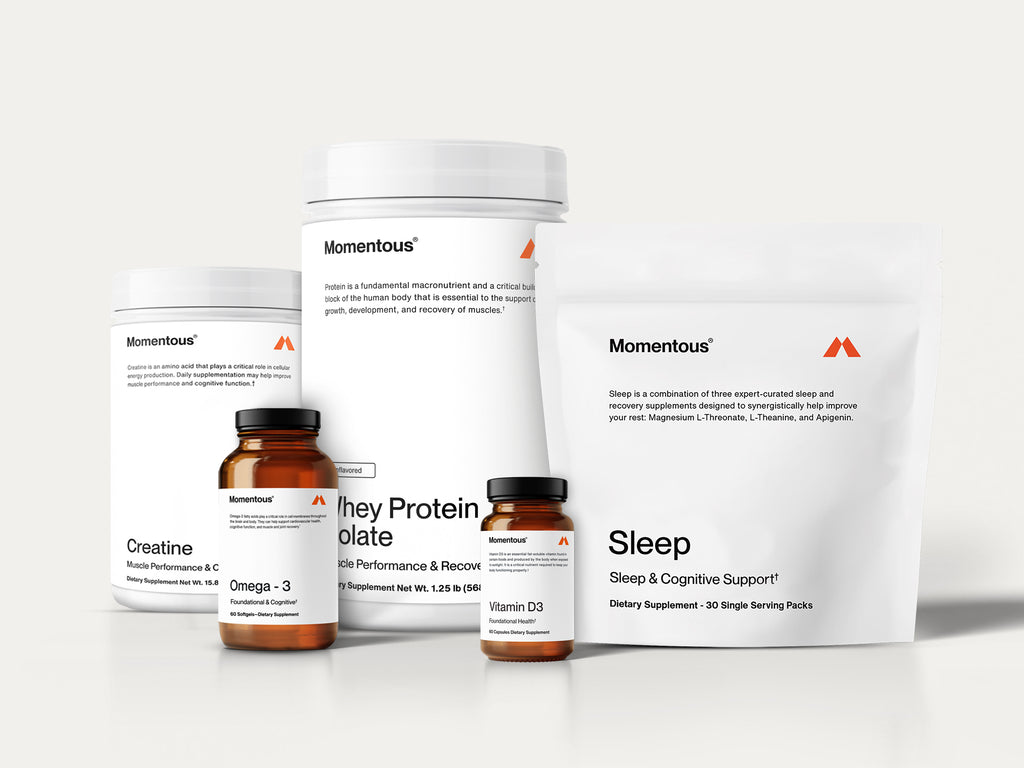Cognitive Health, Cognitive Function
In this exclusive excerpt from his new book, Scarcity Brain, author Michael Easter explains how the scarcity loop works—and how it can impact every aspect of our lives, particularly when it comes to the food we eat, the habits we build, and the consequences for our health and well-being.
Easter, a Momentous ambassador, has spent his career studying physical and mental health. While working on Scarcity Brain, he traveled to the Bolivian Jungle to spend time with the Tsimane tribe, a group of hunter-gatherer horticulturalists in the Bolivian Amazon. In 2017, scientists discovered that the tribe has the healthiest hearts ever recorded by science. And, according to Easter, “their success goes back to what they eat.”
He said: “Food and how it's changing is just one topic Scarcity Brain covers. I traveled around the world—from Bolivia to Baghdad to off-limits casino laboratories in Las Vegas—to understand how our modern world is impacting our physical and mental health.”
And it was at that Vegas casino lab where he uncovered what he calls the scarcity loop: “It’s a three-part habit loop that is the ultimate killer of moderation. There’s nothing better at pushing us into behaviors that can be rewarding in the short term but hurt us in the long run. From overeating and overspending, to spending way too much time on our phones and impacting our performance in the gym, it is arguably the biggest driver of modern problems like chronic disease, burnout, anxiety, addiction, and feeling a lack of meaning.”
He explains that this loop is embedded in some of the most influential technologies affecting our lives, including social media, health trackers, dating apps, finance apps, the rise of sports betting, the news cycle, and even our food, financial, and education systems.
“In the 1970s, the food industry began applying the scarcity loop to how it manufactures food,” he said. “And that’s precisely when obesity began to skyrocket globally. In turn, that led to a surge in disease.”
His takeaway? We can optimize our eating to exit the scarcity loop. And doing that can not only help us improve our nutrition and avoid disease, but also perform better.
Easter added: “We should be thinking food-first, but also looking at how supplements can be a useful tool to ensure we cover all our nutritional bases.
“This is exactly why I’ve partnered with Momentous. They’re not only at the leading edge of nutritional research, but they also ensure rigorous testing. I haven’t encountered a company in my career who does a better job guaranteeing that every product is pure, verified, and exactly what it says it is.”
Please enjoy this excerpt from Scarcity Brain:
In the late 1990s, Kevin Hall was finishing his Ph.D. Cardiovascular disease had dropped from a high in the 1950s because people were smoking less. But over the last couple decades it had been picking up as obesity grew.
Hall is a physicist by training, a hardcore numbers, data, and figures guy. He’s a researcher at the National Institute of Health. This role affords him big funds and resources to do the kinds of tightly controlled experiments that can dive into the nitty-gritty of food’s effect on our health and waistlines. He locks people in labs. But, for ethical reasons, he can keep them there for only so long.
When I spoke with Hall, he told me, “Typically, nutrition science focuses on trying to understand the molecules in the food—the carbs, fats, protein, fiber, sugar, sodium saturated fat—and how the body processes those individual nutrients and whether higher or lower values of any of them is healthier.” Hall had famously discovered, for example, that there’s no difference in weight loss between low-carb and low-fat diets so long as a person eats the same amount of calories.
But in the early 2010s, a group of scientists from Brazil began arguing that, as Hall told me: “We were thinking about it all wrong. The group said that the individual nutrients within food aren’t important or even interesting. They said that the healthfulness of food is really about the extent and purpose of its processing. They said that ultra-processed foods are what’s driving obesity, driving cardiovascular disease.”
“Ultra-processed foods” are officially described as “formulations mostly of cheap industrial sources of dietary energy and nutrients plus additives, using a series of processes and containing minimal whole foods.” Which is to say that the term is a scientific euphemism for “junk food.”
For Hall, the theory from the Brazilian scientists screamed of more bullshit ideas being piled onto the mountain of them in nutrition science. The laws of thermodynamics say that a calorie is a calorie whether it comes from fresh broccoli or a Hostess brownie. “So when I first heard their claim,” he said, “I thought it was nonsense.”
He even called the group to air his grievances and ask hard questions. He pointed out that humans have been processing foods for a long time, yet obesity rose only recently. “I asked them, ‘What is it about ultra-processed foods that you think is bad?’ And the answers I got all seemed to undermine their argument.
They would say, ‘Well, these foods are really high in sugar and salt and fat and they’re low in fiber and protein.’ And I would say: ‘Well, wait a second, you just named a bunch of nutrients. You can’t say it’s not about the nutrients, and then, when I push you, the first thing you say is that these foods are all high in these nutrients that are bad and low in nutrients that are good.’ It struck me as intellectually lazy.”
The only scientific way to shut up another person, especially if that person is a scientist, is to prove them wrong with data. Hard numbers and figures.
“So we brought 20 people into our lab, and they stayed with us for a month,” said Hall. “And we gave them three meals and a box of snacks every day and simple instructions to just eat as much or as little as they wanted.” Tightly controlled research like this is more reliable than standard survey-based nutrition research. That’s because scientists measure exact quantities of food and control for all of the other factors that could influence weight, like exercise, smoking, or stress.
For half the month, the participants’ meals and snacks were a standard American diet filled with ultra-processed foods. For the other half, they were what the Tsimane might eat.
Breakfast for the standard American diet weeks was something like croissants with butter, fatty pork sausage, and bright blue Yoplait yogurt. During the Tsimane weeks it was eggs with potatoes and vegetables. A junk lunch one day was a cheeseburger with fries. A Tsimane lunch was salmon with a sweet potato and green beans. One junk dinner was a fatty burger with buttery mashed potatoes and gravy. A Tsimane take on that same dinner was a leaner cut of steak paired with plain rice and vegetables.
“The two diets were matched for the amount of calories, carbs, fat, sugar, sodium, protein, and fiber,” said Hall. “So I thought, if it’s really these nutrients that are driving weight gain, then there wouldn’t be any difference.”
Hall and his team tracked, weighed, and logged every morsel of food the participants ate.
And, yes, the standard American diet had cookies for dessert—and graham crackers, candied fruits, or peanut butter snacks. Dessert for the Tsimane group, on the other hand, was plain yogurt with some berries, or orange or apple slices.
The results? If you give a human a cookie—or cheeseburger or royal blue yogurt or mashed potatoes injected with butter and cream and topped with thick salty gravy—we will eat more and more of those foods until we fatten up and die of heart disease. If you give a human plain yogurt with some berries—or plain potatoes, lean meat, or rice—we will eat just enough of those foods. We’ll be less likely to fall into a scarcity loop of food.
The people in the study didn’t so much eat the junk diet as pound it. “The people on the ultra-processed diet ate 500 calories more per day and they gained weight and body fat,” said Hall. But when they ate a Tsimane-like diet, “they spontaneously ate less and lost weight and body fat.”
The possible explanations all seem to go back to the scarcity brain and our world of abundance.
One explanation, said Hall, is that ultra-processed foods have an abundance of calories in every single bite. “When you create ultra-processed foods, you concentrate the calories,” he said. “So every bite of food, no matter the nutrients, has more calories.” For example, let’s say we eat two ounces of potatoes. If they’re in plain baked form, it would be 50 calories. In potato chip form, it’s 360 calories.
The second possible explanation echoes the quick repetition embedded in the scarcity loop. “We found that people ate the ultra-processed meals a lot quicker,” said Hall. This could be because the Tsimane foods led the participants’ brains to pump out more of a hormone called PYY, which reduced their appetite. They also decreased a hormone called ghrelin, which made them hungry. The Tsimane foods even took more work to physically chew. The ultra-processed diet, meanwhile, did the opposite. It cut those natural brakes that help us find enough.
So what accounts for the rise in obesity and its heart-stopping side effects? By the 1970s, our scarcity brain—which for millions of years tuned itself to a world of less food and less interesting food—was living in a world of abundance. Food engineered to lead us to eat more—and faster—was everywhere and readily available to most Americans. And we ate it more often.









